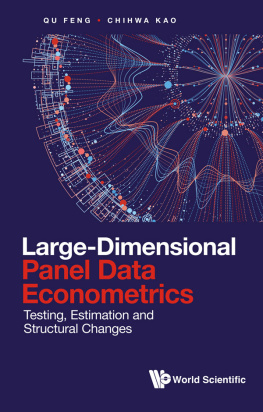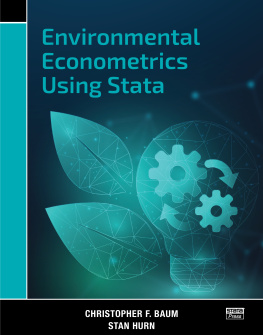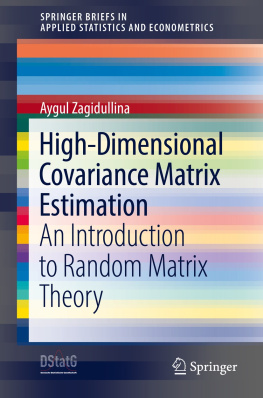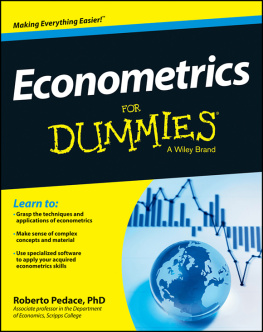Table of Contents


Published by
World Scientific Publishing Co. Pte. Ltd.
5 Toh Tuck Link, Singapore 596224
USA office: 27 Warren Street, Suite 401-402, Hackensack, NJ 07601
UK office: 57 Shelton Street, Covent Garden, London WC2H 9HE
Library of Congress Cataloging-in-Publication Data
Names: Feng, Qu, author. | Kao, Chihwa, author.
Title: Large-dimensional panel data econometrics : testing, estimation and structural changes / Qu Feng, Nanyang Technological University, Singapore, Chihwa Kao, University of Connecticut, USA.
Description: USA : World Scientific, 2020. | Includes bibliographical references and index.
Identifiers: LCCN 2020026843 | ISBN 9789811220777 (hardcover) | ISBN 9789811220784 (ebook) | ISBN 9789811220791 (ebook other)
Subjects: LCSH: Econometrics. | Panel analysis.
Classification: LCC HB139 .F46 2020 | DDC 330.01/5195--dc23
LC record available at https://lccn.loc.gov/2020026843
British Library Cataloguing-in-Publication Data
A catalogue record for this book is available from the British Library.
Copyright 2021 by World Scientific Publishing Co. Pte. Ltd.
All rights reserved. This book, or parts thereof, may not be reproduced in any form or by any means, electronic or mechanical, including photocopying, recording or any information storage and retrieval system now known or to be invented, without written permission from the publisher.
For photocopying of material in this volume, please pay a copying fee through the Copyright Clearance Center, Inc., 222 Rosewood Drive, Danvers, MA 01923, USA. In this case permission to photocopy is not required from the publisher.
For any available supplementary material, please visit
https://www.worldscientific.com/worldscibooks/10.1142/11842#t=suppl
Desk Editors: Balamurugan Rajendran/Karimah Samsudin
Typeset by Stallion Press
Email:
Printed in Singapore
Preface
With the availability of Big Data, one may have more information to identify the underlying causality of economic relationship or forecast important macroeconomic variables or indicators. However, when large volume of data is involved, large dimension could be an issue in the statistical inference of traditional regression models. This book is motivated by the recent development in panel data models with large individuals/countries (n) and large amount of observations over time (T). It introduces testing for cross-sectional dependence and structural breaks in large panels. This book also summarizes important advancement in estimating factor-augmented panel data models and group patterns in panels in recent literature.
This book can be considered complementary to popular panel data econometrics textbooks such as Baltagi (2013), Hsiao (2014) and Pesaran (2015). It is designed for high-level graduate courses in econometrics and statistics. It can be used as a reference for researchers. In specific, . Wei Wang and Mengying Yuan are also acknowledged for helping read the drafts and research assistance. We also wish to thank World Scientific Publishing for giving us the opportunity to undertake this work.
As a personal note, the authors would like to thank their family members. Chihwa thanks his wife Ivy Liu who convinced him of the need for writing this book. Qu wishes to thank his loving wife and parents. The completion of this book would not have been possible without their support.
About the Authors
 Chihwa Kao is a professor of economics and the department head at the University of Connecticut, USA. He received his Ph.D. from SUNY, Stony Brook in 1983. He held a faculty position at Syracuse University from 1985 to 2016. Chihwas research focuses primarily on large dimensional econometrics, such as testing and estimation arising in cross-sectional dependence, panel change points, large factor models, and asset pricing. His work has been published in top economics and statistics journals, including Econometrica, Journal of the American Statistical Association, Journal of Econometrics, Journal of Business and Economic Statistics, Review of Economics and Statistics, Journal of Business, Econometrics Journal, and Econometric Reviews.
Chihwa Kao is a professor of economics and the department head at the University of Connecticut, USA. He received his Ph.D. from SUNY, Stony Brook in 1983. He held a faculty position at Syracuse University from 1985 to 2016. Chihwas research focuses primarily on large dimensional econometrics, such as testing and estimation arising in cross-sectional dependence, panel change points, large factor models, and asset pricing. His work has been published in top economics and statistics journals, including Econometrica, Journal of the American Statistical Association, Journal of Econometrics, Journal of Business and Economic Statistics, Review of Economics and Statistics, Journal of Business, Econometrics Journal, and Econometric Reviews.
 Qu Feng is an associate professor and the head of economics, School of Social Sciences at Nanyang Technological University (NTU), Singapore. Qu joined NTU after he received his Ph.D. from Syracuse University in 2009. His research fields include econometrics, Chinese economy, and financial markets. His papers have been published in top economics journals, including Journal of Econometrics, Journal of Applied Econometrics, and Econometrics Journal. He was honored at the NTU Convocation Ceremony in 2013 for inspirational teaching and mentorship, and was nominated by the department for the Nanyang Award for Research Excellence, NTU, 2012.
Qu Feng is an associate professor and the head of economics, School of Social Sciences at Nanyang Technological University (NTU), Singapore. Qu joined NTU after he received his Ph.D. from Syracuse University in 2009. His research fields include econometrics, Chinese economy, and financial markets. His papers have been published in top economics journals, including Journal of Econometrics, Journal of Applied Econometrics, and Econometrics Journal. He was honored at the NTU Convocation Ceremony in 2013 for inspirational teaching and mentorship, and was nominated by the department for the Nanyang Award for Research Excellence, NTU, 2012.
Contents
Chapter 1
Introduction
This book is motivated by the recent development in high-dimensional panel data models with large amount of individuals/countries (n) and observations over time (T). Specifically, it introduces four important research topics in large panels, including testing for cross-sectional dependence, estimation of factor-augmented panel data models, structural changes and group patterns in panels in the following four chapters. To address these issues, we examine the properties of traditional tests and estimators in large-dimensional setup. In addition, we also take advantage of some techniques in Random Matrix Theory and Machine Learning.
covers testing for cross-sectional dependence in panel data regression models with large n and large T. Cross-sectional dependence, described as the interaction between cross-sectional units (e.g., households, firms and states, etc.), has been well discussed in the spatial econometrics literature. Intuitively, dependence across space can be regarded as the counterpart of serial correlation in time series. It could arise from the behavioral interaction between individuals, e.g., imitation and learning among consumers in a community, or firms in the same industry. This has been widely studied in game theory and industrial organization. It could also be due to unobservable common factors or common shocks popular in macroeconomics.
In recent literature, cross-sectional dependence among individuals is a concern when n is large. As serial correlation in time-series analysis, the cross-sectional of dependence/correlation leads to efficiency loss for least squares and invalidates conventional t-tests and F-tests which use standard variancecovariance estimators. In some cases, it could potentially result in inconsistent estimators (Lee, 2002; Andrews, 2005). Several estimators have been proposed to deal with cross-sectional dependence, including the popular spatial methods (Anselin, 1988; Anselin and Bera, 1998; Kelejian and Prucha, 1999; Kapoor, Kelejian and Prucha, 2007; Lee, 2007; Lee and Yu, 2010), and factor models in panel data (Pesaran, 2006, Kapetanios, Pesaran and Yamagata, 2011; Bai, 2009). However, before imposing any structure on the disturbances of our model, it may be wise to test the existence of cross-sectional dependence.











 Chihwa Kao is a professor of economics and the department head at the University of Connecticut, USA. He received his Ph.D. from SUNY, Stony Brook in 1983. He held a faculty position at Syracuse University from 1985 to 2016. Chihwas research focuses primarily on large dimensional econometrics, such as testing and estimation arising in cross-sectional dependence, panel change points, large factor models, and asset pricing. His work has been published in top economics and statistics journals, including Econometrica, Journal of the American Statistical Association, Journal of Econometrics, Journal of Business and Economic Statistics, Review of Economics and Statistics, Journal of Business, Econometrics Journal, and Econometric Reviews.
Chihwa Kao is a professor of economics and the department head at the University of Connecticut, USA. He received his Ph.D. from SUNY, Stony Brook in 1983. He held a faculty position at Syracuse University from 1985 to 2016. Chihwas research focuses primarily on large dimensional econometrics, such as testing and estimation arising in cross-sectional dependence, panel change points, large factor models, and asset pricing. His work has been published in top economics and statistics journals, including Econometrica, Journal of the American Statistical Association, Journal of Econometrics, Journal of Business and Economic Statistics, Review of Economics and Statistics, Journal of Business, Econometrics Journal, and Econometric Reviews. Qu Feng is an associate professor and the head of economics, School of Social Sciences at Nanyang Technological University (NTU), Singapore. Qu joined NTU after he received his Ph.D. from Syracuse University in 2009. His research fields include econometrics, Chinese economy, and financial markets. His papers have been published in top economics journals, including Journal of Econometrics, Journal of Applied Econometrics, and Econometrics Journal. He was honored at the NTU Convocation Ceremony in 2013 for inspirational teaching and mentorship, and was nominated by the department for the Nanyang Award for Research Excellence, NTU, 2012.
Qu Feng is an associate professor and the head of economics, School of Social Sciences at Nanyang Technological University (NTU), Singapore. Qu joined NTU after he received his Ph.D. from Syracuse University in 2009. His research fields include econometrics, Chinese economy, and financial markets. His papers have been published in top economics journals, including Journal of Econometrics, Journal of Applied Econometrics, and Econometrics Journal. He was honored at the NTU Convocation Ceremony in 2013 for inspirational teaching and mentorship, and was nominated by the department for the Nanyang Award for Research Excellence, NTU, 2012.